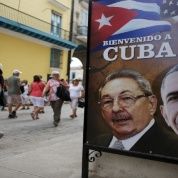Opposition organizations in Cuba are anxiously awaiting President Barack Obama's visit to the island as they look to take advantage of the international spotlight to voice their complaints against the Cuban government.

But according international analyst Ramiro Galarza, these complaints have little to do with the plight of the Cuban people.
“(Much of the) Cuban opposition is not legitimate because it does not seek the well being of Cubans as they claim and is led by U.S.-back powerful groups that have always seek to overthrow the socialist government,” Galarza told teleSUR.
Representatives from groups of Cuba’s most prominent opposition movements, including Ladies in White, will meet with Obama on Tuesday. They are expected to give him a letter demanding the U.S. intervene in various issues, such as the release of prisoners and unmediated access to Internet.
The group is led Berta Soler, the current leader of Ladies in White. Soler is a controversial figure, described as “authoritarian” by former members of her group.
In the past, she has praised the pre-revolutionary Cuba of dictator Fulgencio Batista and called for the U.S. to maintain its repressive blockade on the country.
IN DEPTH: Obama in Cuba
Most media outlets that highlight the work of the Ladies in White leave out any mention of splits within the group.
However, some opposition leaders are disappointed about Obama’s visit, expressing the same disagreements many conservative U.S. opponents have against the restoration of relations between Washington and Havana.
Soler herself has said she is still weighing whether or not she will attend the meeting with Obama, arguing she has not enough authority to press the issue of so-called "political prisoners."
Cuba’s opposition has never been well organized, says Galarza, because different factions and leaders can rarely reach agreements.
“They are only interested in their own cause,” explains Galarza. “(Most) people in Cuba are not familiar with opposition leaders and their demands, not even those who claim refugee status with the U.S. Refugee Admissions Program,” he added.
During what was known as “Cuba’s Special Period,” which lasted from the late 1980’s till the early 2000’s, the isolated country experienced one of its worst economic crisis, provoked by the collapse of the Soviet Union, ally and sponsor of Cuba, but largely caused by the U.S. blockade.
Analyst Galarza said at that time, that several U.S.-back organizations, headed by groups of wealthy Cubans abroad, tried to destabilize the government of then President Fidel Castro, using the adverse situation to sow dissent.
On August 5, 1994, there was a huge demonstration in Havana, with thousands of people in the streets demanding the government take action to improve conditions in the country. Clashes between protesters and police erupted, and when the riot became violent President Fidel Castro gave a passionate speech to the Cubans in an attempt to calm the situation.
He accused the United States of trying to provoke a “bloodbath” in Cuba.
The incident led to the reforms that softened the restrictions on dissident movements while advocating for non-violence. Those reforms have steadily improved in recent years.
However, the U.S. government continues to embolden Cuba’s opposition.
In 2014, “the Cuba Twitter” controversy caused a stir after the Associated Press reported that the social media platform ZunZuneo, named after Cuban slang for a hummingbird, was allegedly intended to destabilize the Cuban government by encouraging Cuban users to create “smart mobs” and "renegotiate the balance of power between the state and society."